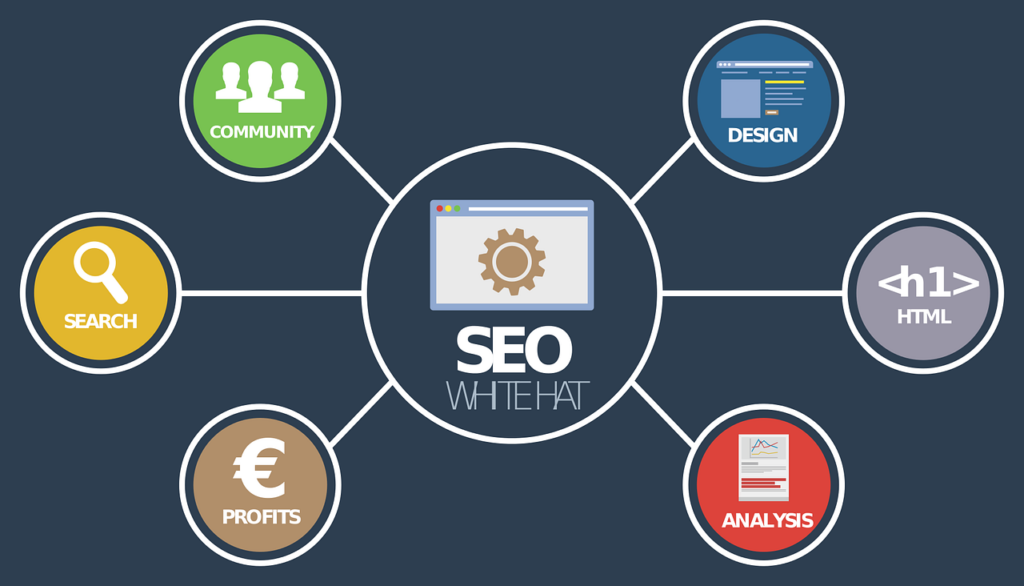
In the vast and ever-evolving digital landscape, where websites compete for attention and visibility, SEO marketing emerges as a pivotal strategy to elevate a website’s ranking and drive efficient gains. This article delves into four key types of SEO strategies: On-Page SEO, Off-Page SEO, Local SEO, and Technical SEO. Each of these strategies plays a distinct role in enhancing a website’s visibility, attracting users, and yielding effective benefits. Let’s embark on a journey through the realm of SEO and explore how these strategies can revolutionize your online presence.
On-Page SEO : Crafting a Captivating Web Presence

On-Page SEO revolves around optimizing core elements like title tags, meta descriptions, images, URLs, and content. This strategy aims to enhance the content and structure of web pages, making them more easily recognizable by search engines while delivering an improved user experience. Factors such as keyword density, title length, and image alt attributes play a pivotal role in optimizing web pages.
- Title Tags: Crafting titles like “Exploring the Best Beach Destinations for Your Summer Getaway – 2023” places keywords upfront, emphasizing relevance and currency.
- Meta Descriptions: Including keywords in meta descriptions, such as “Introducing the top beach destinations for your 2023 summer vacation. Delight in stunning landscapes and fantastic resorts,” succinctly summarizes the page’s content.
- Images: Utilize high-quality images depicting beachscapes and employ appropriate alt attributes such as “Summer Vacation, Best Beach Destinations” to reflect relevant keywords.
- URLs: Incorporate keywords into URLs, for instance, www.example.com/summer-getaway/best-beach-destinations.
- Content: Offer diverse content including vacation planning tips, introductions to prime beach regions, and tips for selecting resorts, providing users with valuable information.
Off-Page SEO : The Art of Link Building and Brand Recognition

Off-Page SEO involves obtaining backlinks from external websites, leveraging online reviews and brand signals to elevate search engine rankings. High-quality backlinks enhance a website’s credibility in the eyes of search engines, and bolstering brand trust through online reputation management is equally crucial. This strategy effectively boosts search engine rankings by augmenting a website’s popularity and influence.
- Backlinks: Obtain links from travel-related blogs or agency sites, securing endorsements like “This is the place for the best beach getaway in 2023!”
- Online Reviews: Encourage travelers to leave positive reviews on various travel communities and reputation management platforms.
- Brand Signals: Strengthen brand signals by getting travel experts or writers to quote or share the website on social media.
Local SEO : Winning the Hearts of Local Users
Local SEO involves increasing brand awareness from a local perspective and attracting regional users. Utilize local search keywords to provide relevant content for local customers. Register with platforms like Google My Business to ensure visibility on local search engines. Accurate provision of map information, business hours, and contact details builds trust among local users.
For example, consider a café review site targeting the keyword “Best Cafes in Seoul.”
- Local Keyword Usage: Incorporate the local keyword naturally into titles, meta descriptions, and content, signaling to search engines the local relevance.
- Map Information: Display a map of Seoul on the webpage, enhancing search engine crawler recognition of the location.
- Google My Business: Register café information with Google My Business to appear in local search results. Provide updated operating hours and contact details for user convenience.
- User Reviews: Feature diverse user reviews of Seoul cafes on the website, encouraging interaction with a recommendation feature. Search engines trust user reviews, granting bonus points to sites with substantial reviews.
- Local-Related Content: Offer content like café tours in Seoul, recommendations, and café events, arousing local users’ interest.
Technical SEO : The Architecture of Seamless User Experience
Technical SEO optimizes a website’s structure and technical aspects. It aims to enhance user experience by improving page loading speed and adopting mobile-friendly designs. Configuration of site maps, robot.txt files, and SSL certificates facilitates smooth search engine crawling and visibility on search engine results.
Here’s a succinct exploration of seven ways to optimize web hosting server performance
- Optimize Web Hosting Server Speed: Enhance server response speed through techniques like caching, compression, and browser caching to improve user experience and facilitate search engine crawler indexing.
- Mobile-Friendly Design: Implement responsive design to ensure web pages are correctly displayed on mobile devices. Mobile-friendly designs boost user satisfaction and improve visibility in mobile searches.
- Site Map Creation: Submit a sitemap to facilitate search engine crawlers’ access to all web page content, aiding in site structure recognition and page indexing.
- Robot.txt File Configuration: Use robot.txt files to restrict crawler access to certain pages and prioritize indexing of essential pages.
- SSL Certificate Usage: Apply SSL certificates for secure connections, safeguarding users’ personal information and earning recognition as a secure site by search engines.
- URL Structure Optimization: Utilize clean, structured URLs that provide meaning to users and search engines. Incorporate meaningful words, such as “/services/web-hosting/optimize-server-performance.”
- Accessibility Optimization: Enhance website accessibility by providing text content on web pages and using alt attributes for images, aiding search engines in content recognition.
Combating Bounce and Boosting Search Rank through Faux-Go Stick Prevention
Faux-Go Stick prevention involves employing relevant keywords and removing low-performance pages to prevent users from clicking on search results and immediately bouncing back. Using pertinent keywords and delivering valuable content engages users’ interests, while minimizing non-performing pages that search engines index enhances search ranking.
For instance, prevent faux-go sticking by using keywords like “How to Plan a Vacation” and “Best Beach Destinations for a Summer Getaway.” This strategy increases the likelihood of users actually reading or engaging with the content they click on, rather than immediately navigating away.
Leveraging Industry Research for Backlink Acquisition
Harnessing industry research for backlink acquisition proves to be a potent strategy for enhancing search engine ranking. Providing captivating research outcomes and statistical data encourages other websites to reference your content. Backlinks garnered through research bolster a website’s credibility in search engines’ eyes.
- Select a Research Topic: Choose topics of significance or popularity within the industry. For instance, “Predicting 2023 Digital Marketing Trends” could attract citations and backlinks from digital marketing-related sites.
- Data Collection and Analysis: Collect reliable data and perform statistical analysis on the industry. Accurate and original data is more likely to be referenced and linked by other sites.
- Publish and Share Results: Share research findings on your website and widely disseminate through social media. Clear explanations, graphs, and charts ensure effective communication of information.
- Promote within Industry Communities: Present research outcomes within relevant industry communities, gaining attention from experts. Presenting findings at conferences or webinars enhances interest and backlink acquisition.
- Press Releases and Media Coverage: Compile research results into press releases and distribute them to media outlets, encouraging them to mention the research. Media coverage-backed backlinks enhance a website’s trustworthiness.
- Utilize Blogs and Forums: Introduce research results in relevant blogs or online forums, engaging users and acquiring links.
- Write Research Notes: Transform research findings into research notes for academic websites to cite and link to.
The Significance of SEO Marketing: A Path to Digital Triumph
In the rapidly shifting digital arena, SEO marketing emerges as a beacon of success, guiding websites toward enhanced visibility, user engagement, and business growth. By intertwining the threads of On-Page SEO, Off-Page SEO, Local SEO, and Technical SEO, websites can forge a robust digital presence that commands attention and drives conversions. Embrace the strategies, adapt to the ever-evolving SEO landscape, and let your website ascend the ranks, seizing the digital triumph that awaits.
FAQs About SEO Strategies
Q1: Are all four SEO strategies equally important?
A1: Each strategy plays a vital role, contributing to overall SEO success. On-Page SEO enhances content relevance, Off-Page SEO builds credibility, Local SEO targets specific audiences, and Technical SEO ensures smooth user experience.
Q2: How long does it take to see results from SEO efforts?
A2: SEO is a long-term investment. Initial results may appear within a few months, but significant impact usually takes 6 to 12 months or more, depending on competition and strategy effectiveness.
Q3: Can I perform SEO on my own or should I hire professionals?
A3: While basic SEO can be implemented by individuals, hiring professionals brings expertise, experience, and the latest insights to craft effective strategies, especially in competitive markets.
Q4: Is local SEO relevant for online businesses without a physical presence?
A4: Yes, local SEO can still be beneficial. It helps businesses appear in search results when users search for products or services in a specific location, even if the business operates solely online.
Q5: How often should I update my website’s content?
A5: Regular content updates are beneficial for both users and search engines. Aim for consistent updates, whether it’s weekly, bi-weekly, or monthly, to keep your website relevant and engaging.
In Conclusion
In the expansive digital tapestry, mastering the art of SEO marketing stands as a linchpin for website triumph. By understanding and implementing On-Page SEO, Off-Page SEO, Local SEO, and Technical SEO strategies, websites can ascend the ranks, commanding attention, and achieving digital excellence. The digital realm is yours to conquer – seize the SEO strategies, embrace the challenges, and bask in the glory of heightened visibility and success.